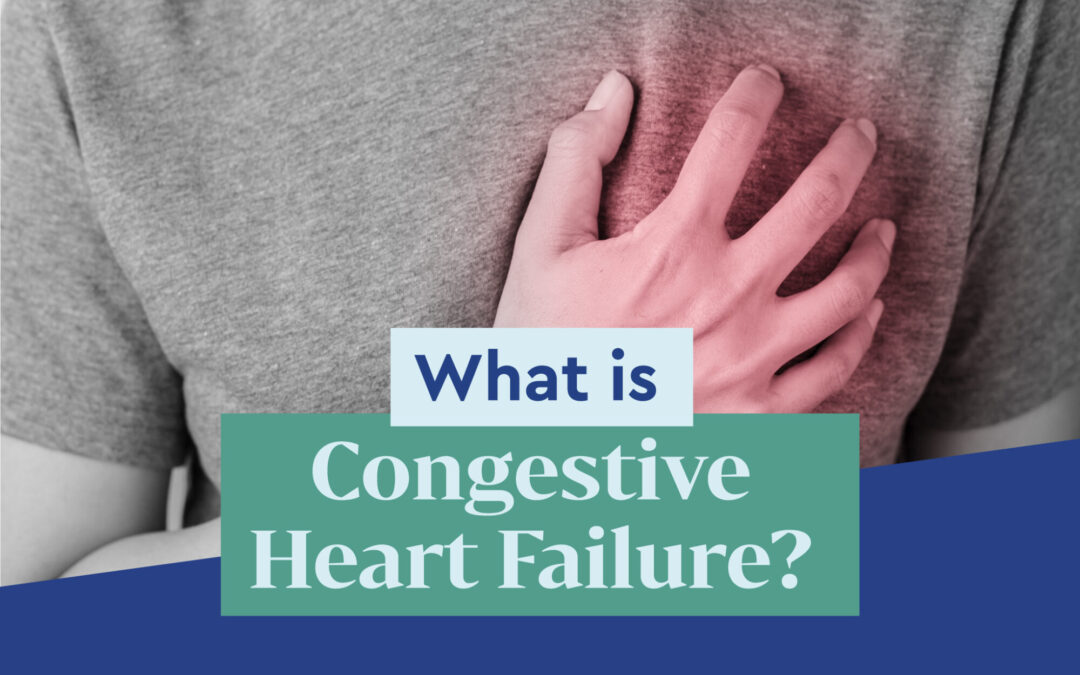Congestive heart failure (also just called “heart failure”) is the #1 cause of hospitalization for people 65 and older. But it can start at a much younger age. And it is affecting more people than ever: 6.2 million Americans per year, and growing.
What Is Congestive Heart Failure?
Congestive heart failure is when the heart doesn’t pump blood as well as it should. That means oxygen-rich blood doesn’t move through the body the right way, and puts extra stress on the heart.
Heart failure affects more than just the heart – it can actually “congest” the body, which is why it is also called congestive heart failure. When the heart muscle can’t pump blood correctly, the blood often backs up and fluid can build up in the lungs, leading to shortness of breath. The kidneys are also affected, leading to water retention and fluid build-up in the arms, legs, and other organs.
Congestive heart failure is a chronic condition that can take years to develop. It usually can’t be cured – but with the right medical care it can often be controlled. That’s why it’s so important to know what signs to look for – and to see a doctor when you see the signs.
Symptoms of Congestive Heart Failure
Heart failure symptoms can sometimes be tricky to spot, especially in the early stages – but missing those symptoms can be very dangerous.
The most common symptoms of congestive heart failure include:
- Shortness of breath
- Feeling tired (fatigue) & leg weakness
- Reduced movement / exercise ability
- Weight gain
- Swelling in ankles, legs, and abdomen
- Increased need to urinate at night
- Rapid or irregular heartbeats
- Dry, hacking cough
- Bloated or hard stomach, reduced appetite, upset stomach
People suffering with heart failure may have some or all of these symptoms – and the symptoms may be mild at times or even come and go. But the heart failure is not gone. That’s why it’s so important to see your doctor as soon as you experience any symptoms or if your symptoms get worse.
Unfortunately, heart failure gets worse as time goes on, leading to more severe outcomes such as heart attacks. If you are experiencing chest pains, fainting, or skin that looks blue, call 911 immediately.
Risk Factors for Congestive Heart Failure
Basically, any condition that damages the heart can lead to heart failure. And there are many medical conditions and lifestyle choices that can contribute to this risk.
Some of the most common contributing risk factors for heart failure include:
- Coronary artery disease – narrowed arteries can limit the supply of oxygen-rich blood, weakening the heart muscle
- Heart attack – a form of coronary artery disease
- Heart valve disease – a valve that doesn’t work right can be hard on the heart
- High blood pressure – the heart has to work harder when blood pressure is high
- Irregular heartbeats – abnormal rhythms can weaken the heart muscle
- Congenital heart disease — some people are born with heart problems
- Diabetes – increases risk of high blood pressure and coronary art disease
- Some medications – always be sure doctors know all the medications you are taking
- Tobacco, alcohol, and recreational drug use – be honest with doctors about lifestyle choices
Treatment of Congestive Heart Failure
Congestive heart failure is usually not curable and gets worse over time. It can also be life-threatening. However, many people can live longer with better quality of life through proper medical attention and self care.
- Medical treatment can often help keep symptoms under control and may even help patients live longer. For some people, that may mean medication and monitoring. For others with severe symptoms, a heart transplant or ventricular assist device (VAD) may be required. Seeking and sticking with medical care is critical for this serious condition.
- Making healthier lifestyle changes can also help improve quality of life for those with congestive heart failure. Quitting smoking, losing weight, exercising, reducing sodium, and managing stress are all positive steps in the fight against heart failure. (Always have your doctor approve any major lifestyle changes.)
Can Congestive Heart Failure Be Prevented?
While some heart failure is genetic and cannot be prevented, leading a healthy lifestyle is the best way to reduce most potential causes. This can help prevent and control conditions that can cause congestive heart failure in the first place – conditions like coronary artery disease, high blood pressure, diabetes, and obesity.
Eat right. Exercise. Manage stress. Don’t smoke. Maintain a healthy weight. Have annual physical check-ups. And if you notice any warning signs of congestive heart failure, contact your doctor right away – don’t wait.
CareWell Health’s Care Center is here to assist you with all your needs: 973-266-8416
CareWell Health has cardiology services to provide the care you deserve in preventing, diagnosing, and treating congestive heart failure – including outpatient services like stress tests, electrocardiograms (EKGs), and echocardiography.
If you or a loved one are suffering from these or any other medical symptoms, don’t wait: call 973-266-8416 to make an appointment, or visit our Emergency Department for immediate attention.

